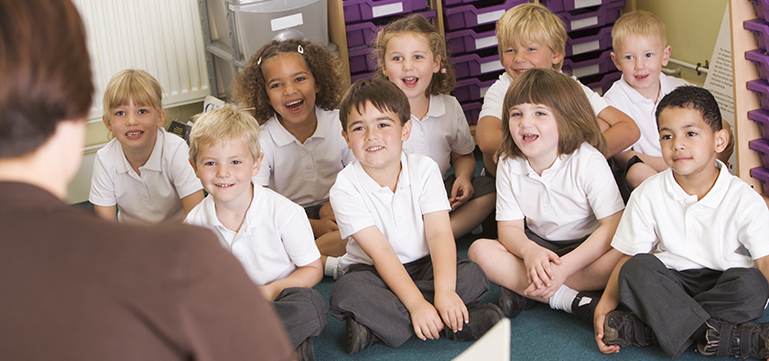Rapid development of pupils’ oracy skills

Context and background to the effective or innovative practice
Historically pupils’ oracy skills on entry to the school is well below those expected for pupils of a similar age. A high percentage of pupils have limited or no speech upon joining the nursery class and some receive early input from speech and language therapists, with targets set to develop early language acquisition.
Description of nature of strategy or activity
Highly trained and experienced staff in the early years’ department assess the oracy skills of individual pupils within the first two weeks of starting in the nursery class. Activities and focused sessions are then planned to match the specific needs of each pupil. Individual timetables are created for pupils, and all staff are made aware of the oracy levels of all pupils and discuss how best to support and develop their communication skills.
All staff in the foundation phase have completed training to use basic sign language with all learners throughout the day. Within the nursery classes, a dedicated time is given to daily ‘Sing and Sign’ sessions and all pupils are encouraged to sign key vocabulary. Practitioners use the same vocabulary (spoken and signed) during every session to describe the routine and weather and announce the day, which the children learn in rote fashion. Once pupils become familiar with the key signs, practitioners use Welsh words instead of English. This eases the children into a bilingual culture and they quickly develop the ability to use both languages alongside the signing. Eventually, when speech becomes clear the signs are naturally dropped as they are no longer necessary.
The development of speaking and listening skills is a focus in the early years’ classes, with all planned activities concentrating on improving clarity of speech and further promoting a more varied vocabulary. Skilled staff speak to individual pupils at a level appropriate to their oracy needs and encourage the correct pronunciation of words and development of sentences at two and three word levels. Key members of staff are assigned to pupils with targeted speech interventions, supported and often set by the speech and language therapists. Through play activities, staff closely monitor the progress made in oracy. Using the foundation phase philosophies, activities are ‘hands on’ and utilise real experiences for the promotion of good oracy skills.
Through close links with parents, therapists and highly trained practitioners, rapid progress is recorded and new challenging targets set as soon as required. Parents have attended sessions on sign language, delivered by staff through the Family and Community Engagement (FaCE) projects. In addition, and when pupils show a readiness, parents are then invited into the school to learn about phonics alongside their child and how the school promotes the further development of speech and vocabulary.
All pupils throughout the school have ‘Person Centred Profiles’, which are easily accessible within classes. In the early years, these detail the most effective method of communication for every child. Statements such as “I speak in Polish,” “I use Makaton signs,” and “I speak slowly so please give me time” are clearly displayed. New or temporary staff are therefore well prepared before meeting pupils and, as a result, any frustrations or misunderstandings are avoided.
During whole class teaching, stories with repetitive language are specifically chosen to promote and develop oracy skills. These stories often last over a period of two weeks and activities are based around the stories created by the children. This ethos of child-led learning continues throughout the school, with the school council determining the themes of study for the year.
Older pupils regularly visit the early years’ department to engage with the younger children in short sessions or projects that help to develop speech and communication skills. By modelling new and extended vocabulary or sentence patterns, the younger children are eager to mimic and use these new skills within their own play.
What impact has this work had on provision and learners’ standards?
-
By the end of foundation phase, most children (90%) achieve the expected outcome or higher for oracy
-
At the end of key stage 2, nearly all pupils achieve level 4 in oracy, with over half achieving level 5
-
Peer-to-peer learning has a positive impact on the personal and social development skills of all children, with nearly all achieving outcome 5 or above at the end of Year 2
-
Parents are more aware and better equipped to support their children through the use of sign language and other strategies
-
Children are happy in school and are able to access exciting learning opportunities
How have you shared your good practice?
With regard to pupils who require assistance in developing their in speech and language skills, the school has shared its approaches with schools within their cluster of schools and within the local authority. It has also shared its work with individual schools on request.
The good practice has recently been used to establish a new provision within the school for pupils who have a diagnosis of non-verbal Autism Spectrum Disorder.
Useful links
Other resources from this provider

Community schools: families and communities at the heart of school life

Effective provision for pupils who have additional learning needs

Curriculum innovation in primary schools
pdf, 896.02 KB Added 17/05/2018
